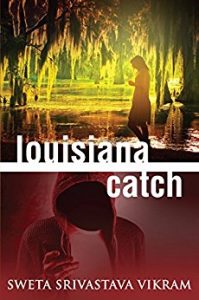A little while ago, I shared Sharon’s review of Louisiana Catch, the story of an abuse survivor making her way in an online world that is not what it seems… In Sharon’s words, “Vikram’s deeply humanistic story blatantly exposes the problems posed by identity shame and projected images, and does so in a writing style that is superbly readable and was thoroughly enjoyable, even when difficult to read.”
Today I’m pleased to share an author interview/Q&A with Sweta Vikram. It provides backstory and additional information about the book and its writing, and it will spark your attention for the novel, if you haven’t already heard about it… Enjoy!
Question and Answer Session with Sweta Vikram
 WHAT INSPIRED YOU TO WRITE LOUISIANA CATCH?
WHAT INSPIRED YOU TO WRITE LOUISIANA CATCH?
The quest for identity and need for highlighting existing social issues are integral to my writing. I believe they are both intertwined and rooted in shame and cultural boundaries. We often find the truth about ourselves during challenging times or when we are emotionally, as well as physically, displaced. I also wanted to highlight grief and vulnerability—how they can help reveal our strength and core.
HOW DID YOU COME UP WITH THE TITLE?
“Catfishing” is rampant. I have interviewed psychotherapists and psychologists who confirmed that many of their clients are in therapy because they got duped by someone they met online and fell in love, and sometimes even married them, without realizing this person had a whole other life. Also, both the male protagonist and male antagonist in the book are from Louisiana. The title Louisiana Catch symbolizes catfishing as well as the man whom the female protagonist, Ahana, eventually ‘catches’ as a partner—it’s revealed as the book progresses.
WHY DID YOU CHOOSE NEW ORLEANS AS THE SETTING?
New Orleans (“NOLA”) is one of my favorite places in the U.S., so I wanted to write about the magic of NOLA. Aside from that, much like New Delhi, NOLA is known for its sweltering summers, legendary musicians, charming hospitality, rich heritage, tantalizing foods, and diverse culture. Setting the story in NOLA allowed me to draw parallels between the cultures of the two cities—New Delhi too appears in the book—and show a thread of similar sensibility at the crux of it all.
WHAT DREW YOU TO WRITE ABOUT A HEROINE RECOVERING FROM MARITAL RAPE?
I have seen up close that emotional abuse can sometimes cause deeper damage than physical abuse. Because we don’t see scars, we underestimate the harm done, and ignore the signs of PTSD. I know women who are victims and survivors of marital rape. There is much shame and loss of identity attached to this heinous crime, so that some of them are still married to their abusive husbands and won’t talk about it to anyone. They either don’t know how to or lack the courage to say NO. I wanted to highlight the emotional and psychological battles that women of marital rape face. And how that impacts their actions, relationships, and day-to-day life.
 AHANA USES BOTH YOGA AND MEDITATION TO COPE WITH TRAUMA. HOW DID YOU COME TO MODEL THESE?
AHANA USES BOTH YOGA AND MEDITATION TO COPE WITH TRAUMA. HOW DID YOU COME TO MODEL THESE?
I am a certified yoga instructor as well as an Ayurveda health counselor. Part of my yoga training also includes trauma training as well as Ayuryoga (yoga based on Ayurvedic principles, where you design sequences that take into consideration individual needs, seasons, imbalances, and emotional state). It just so happens that I teach yoga to female survivors of violence as well as creative professionals and entrepreneurs, so I am trained to recognize triggers.
WHAT WAS THE MOST CHALLENGING PART OF WRITING THIS BOOK?
Writing the scene where Ahana, the female protagonist, gets a call that her mother is in hospital—tied to tubes and breathing through a ventilator—was like opening old, raw wounds and sprinkling salt on them. It was extremely personal and cruel, as I lost my mother in 2014, and much like Ahana’s mother, my mom passed away suddenly. Describing some of Ahana’s emotions meant reliving the heartache, horror, and darkness brought upon by loss and grief.
WHO SHOULD READ THIS BOOK? FOR WHOM WAS IT WRITTEN?
This book is for anyone interested in reading about real human relationships, social issues plaguing our world, a journey with identity, strong women, hybridization of cultures, the role of grief and healing in shaping our lives, and the impact of social media networking on all of these aspects. It has exciting plot twists, a romantic angle, and pertinent social messages.
***
SWETA SRIVASTAVA VIKRAM, featured by Asian Fusion as “one of the most influential Asians of our time,” is an award-winning author of 11 books, five-time Pushcart Prize nominee, mindfulness writing coach, and wellness columnist. Sweta’s work has appeared in The New York Times and other publications across nine countries on three continents. A graduate of Columbia University and a certified holistic health counselor, Sweta performs her work, teaches creative writing workshops blending yoga, meditation, and Ayurveda, and gives talks at universities and schools across the globe. She lives in Queens, NY with her husband. Visit the author’s website at www.SwetaVikram.com.


 Jill-Elizabeth LinkedIn
Jill-Elizabeth LinkedIn



Leave a Reply